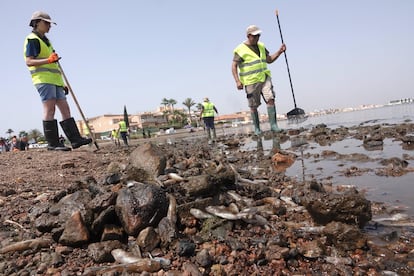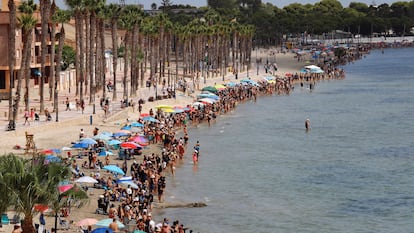Some 70,000 people form human chain to protest environmental crisis at Mar Menor
The demonstrators also held a minute of silence in a symbolic gesture of mourning for Murcia’s saltwater lagoon, where thousands of fish recently died from lack of oxygen
Around 70,000 people gathered on Saturday to form a human chain along the 73 kilometers of coastline surrounding the Mar Menor to protest the serious environmental crisis facing the saltwater lagoon in Murcia, in southeastern Spain.
The state of Spain’s Mar Menor has been in decline for years, but the situation has worsened in the last two weeks with the appearance of nearly five tons of dead fish, which were asphyxiated due to a lack of oxygen. A similar phenomenon was seen in 2019, when thousands of fish washed up after being asphyxiated by the effects of intensive farming nearby.
This time, the crisis is also being blamed on the excessive amount of nutrients – nitrates and also phosphates and ammonium – that are running into the 170 square kilometer lagoon, mainly from agricultural fertilizers.

In a bid to raise awareness of the problem, activists gathered Saturday morning under the slogan: “Let’s embrace the Mar Menor.” Tens of thousands of people formed a human chain around the saltwater lagoon and held a minute of silence in a symbolic gesture of mourning for the ecosystem, which is doomed to further degradation if urgent measures are not taken. “It is a dignified way to say goodbye to so many animals that have died due to human greed,” Jesus Cutillas, the spokesman for the coordination group, Abracemos el Mar Menor (Let’s Embrace the Mar Menor), told news agency Europa Press.
The thousands of activists also listened to a hymn dedicated to the lagoon, composed and sung by the Cartagena band Nunakat called Sun and Salt, with other artists joining in, such as Miguel Rios, Rozalén, Anni B Sweet, Carlos Tarque, Rozalén, Arde Bogota, Ayoho, Gabriel de la Rosa from the group Shinova, Nina de Juan from Morgan and Sean Frutos from Second.
A sailboat helmed by the environmental group Ecologists in Action also took part in the protest. The NGO criticized the “mismanagement” of the Mar Menor and asked policy makers to “put an end to this ecological disaster.” The yacht, called Diosa Maat, toured the most emblematic areas of the lagoon and displayed banners demanding a future for the Mar Menor. Ecologists in Action spent the day at the center of the lagoon, near the volcanic island Perdiguera where they recorded the state of the water. The environmental organization has spent years denouncing the “terrible” state of the Mar Menor and stressed last week that “thousands of fish and crustaceans are dying on the shores of what was the regional environment’s crown jewel.”
According to Ecologists in Action, intensive farming is to blame for the crisis as it contaminates the soil and the groundwater with nitrates from fertilizers, which end up in the Mar Menor, causing eutrophication. This happens when there is an excessive amount of nutrients in the water, provoking the growth of phytoplankton which reduces the amount of oxygen.
“Scientists insist that the biggest problem with the Mar Menor is the massive and constant discharge of nitrates and the solution is to make sure 85% of the poison does not get in,” said Cutillas from Abracemos el Mar Menor.
Cutillas also complained about the lack of response from Spain’s political parties, which have been engaged in a blame game over who is responsible for the crisis. The central government – a coalition of the Socialist Party (PSOE) and leftist Unidas Podemos – has pointed the finger at the regional administration, which it accuses of “years of inaction.” While the conservative Popular Party (PP), which is in power in Murcia, has claimed that the region does not have the powers needed to solve the crisis. In the meantime, protesters have called on Spain’s minister for environmental transition, Teresa Ribera, of the PSOE, to ban illegal irrigation and create a fertilizer-free area.
According to Cutillas, politicians have become “public relations” vehicles and “need to learn how to manage things because that’s what we pay them to do.” In this regard, he stressed on Saturday that scientists have been warning those who have the “power” to act for “a long time.”
English version by Heather Galloway.
Tu suscripción se está usando en otro dispositivo
¿Quieres añadir otro usuario a tu suscripción?
Si continúas leyendo en este dispositivo, no se podrá leer en el otro.
FlechaTu suscripción se está usando en otro dispositivo y solo puedes acceder a EL PAÍS desde un dispositivo a la vez.
Si quieres compartir tu cuenta, cambia tu suscripción a la modalidad Premium, así podrás añadir otro usuario. Cada uno accederá con su propia cuenta de email, lo que os permitirá personalizar vuestra experiencia en EL PAÍS.
¿Tienes una suscripción de empresa? Accede aquí para contratar más cuentas.
En el caso de no saber quién está usando tu cuenta, te recomendamos cambiar tu contraseña aquí.
Si decides continuar compartiendo tu cuenta, este mensaje se mostrará en tu dispositivo y en el de la otra persona que está usando tu cuenta de forma indefinida, afectando a tu experiencia de lectura. Puedes consultar aquí los términos y condiciones de la suscripción digital.
More information
Últimas noticias
Most viewed
- Oona Chaplin: ‘I told James Cameron that I was living in a treehouse and starting a permaculture project with a friend’
- Reinhard Genzel, Nobel laureate in physics: ‘One-minute videos will never give you the truth’
- Sinaloa Cartel war is taking its toll on Los Chapitos
- Why the price of coffee has skyrocketed: from Brazilian plantations to specialty coffee houses
- Silver prices are going crazy: This is what’s fueling the rally











































